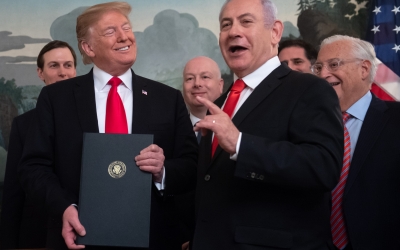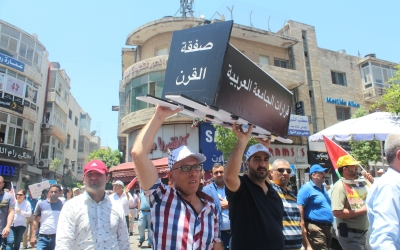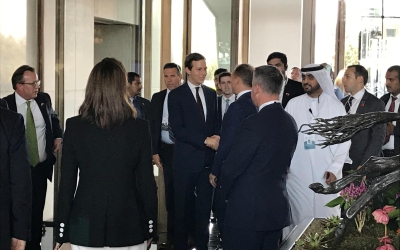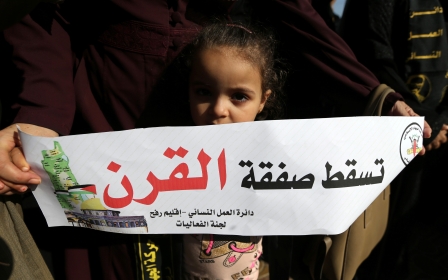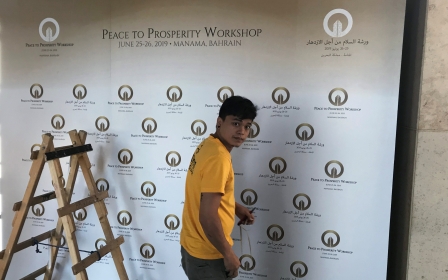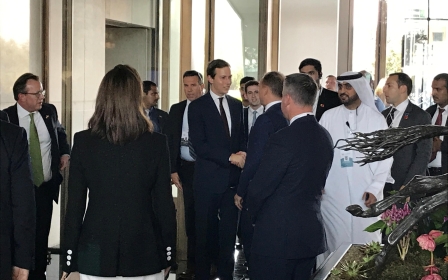Palestinians in Gaza rail against 'second Balfour' in Manama
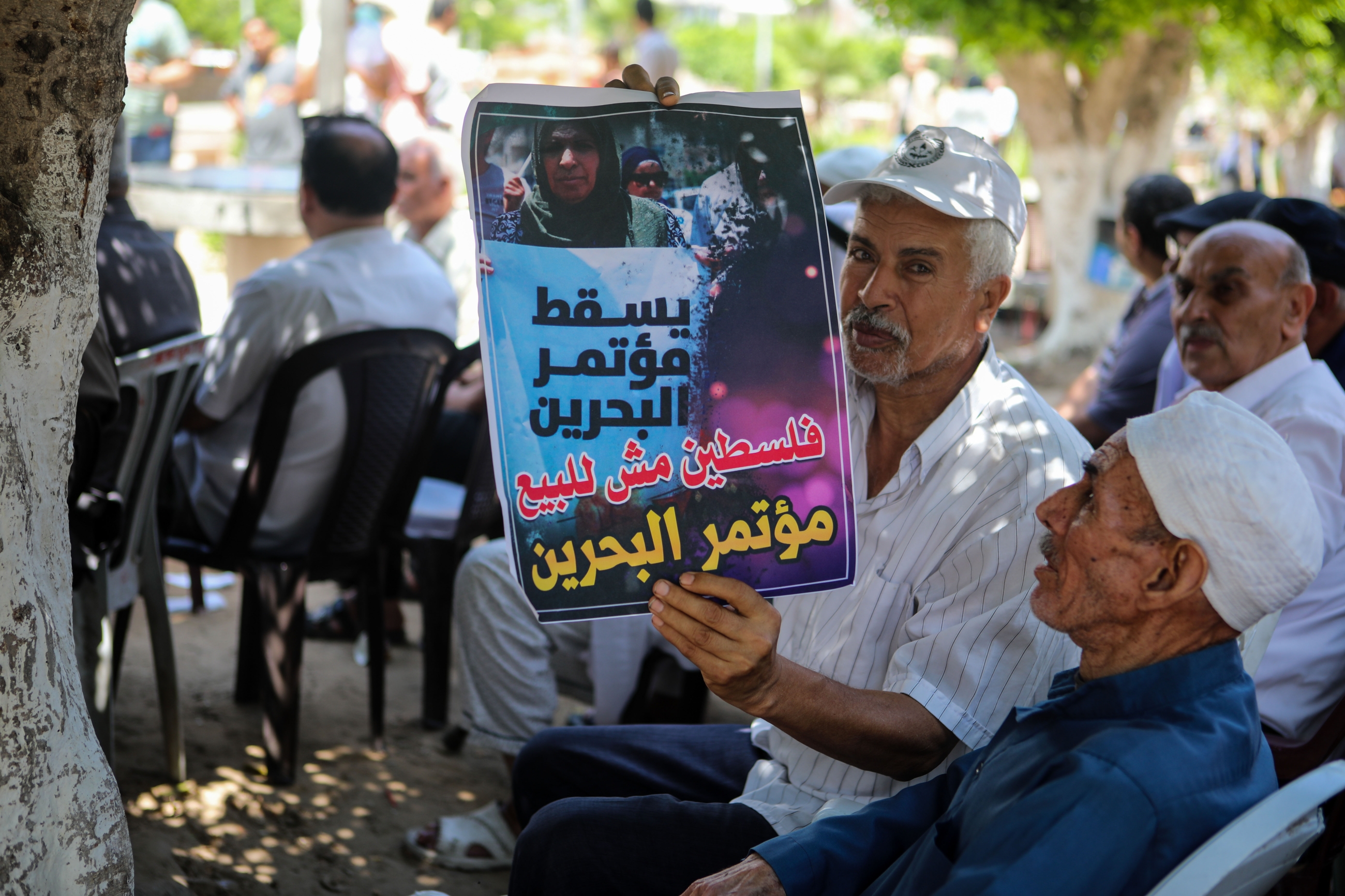
Shops, banks and offices were mostly closed and neighbourhoods were empty in the Gaza Strip on Tuesday, as the enclave joined a general strike across Palestinian cities in protest against the US-led "economic workshop" in Bahrain.
The strike comes ahead of mass protests planned for Wednesday to coincide with the second day of the "Peace to Prosperity" meeting in Manama where US officials are seeking to sell the economic portion of President Donald Trump’s "deal of the century" plan to resolve the Israel-Palestine conflict to its Gulf Arab allies, despite overwhelming Palestinian opposition.
"This cannot in anyway be acceptable. It is more like a public auction where the US and Arab countries are offering something they do not own for sale," Areej Mohammed, a Gaza-based 27-year-old human rights activist, told Middle East Eye.
"We will not allow another Balfour Declaration to pass while we sit here and watch," she said, referencing the 1917 document in which the British government expressed support for the establishing of a Jewish state in Palestine, which was then under British rule.
"It is such a shame that Arab countries are complicit in this conspiracy. This workshop came to normalise what Palestinians have been struggling against for ages," she added.
According to leaked details of an alleged document that was part of the deal published by Israeli newspaper Israel Hayom, the besieged enclave and the West Bank would be connected by a highway built 30 metres above ground.
A White House document published ahead of the conference outlining the US plans also includes a proposal to seek investments to finance the development of a "transportation corridor directly connecting the West Bank and Gaza through a major road and, potentially, a modern rail line".
Palestinians have been mostly denied the right of travel between Gaza and the West Bank since the early 1990s, when Israel imposed movement restrictions on people in the Strip, and tightened them in 2007, after Hamas took control from the Palestinian Authority.
'Deal of shame'
"It has been my dream for the past thirty years to be able to visit my relatives in the West Bank regularly and without restrictions," said 84-year-old Fadila al-Ashi.
"But this is not a reason to be satisfied with the deal of shame they are planning to pass. It is true that I would love to visit all of occupied Palestine, but not this way.
"I could never get over the experience when we were forced out of our homes and lands during Nakba. It was one of history’s most unjust cases. I do not want this generation to live the same horrific experience again," she continued, referencing the 1948 events when many Palestinians were expelled from their homes or forced out by the threat of violence during the creation of the state of Israel.
In a sit-in held in the al-Jundi al-Majhoul square in the centre of Gaza City, dozens of Palestinians chanted against the Bahrain workshop and denounced the Arab states attending the event, which included Saudi Arabia, the United Arab Emirates and Qatar.
Fawzia al-Masri, a Palestinian businesswoman who held posters decrying the deal, said: "Palestinians are calling for the right of return, not another displacement.
"What do we get if they improve our economic situation and take our homes in return?" she asked. "It is not worth it and whoever agrees on this deal is a traitor."
"Our political crisis is far more crucial than our economic crisis. Addressing the economic situation while the refugee question remains unresolved and the occupation is continuing to annex our lands is unacceptable."
Hejazi al-Ghayeb, who also took part in the sit-in, said Palestinians would never agree to accept alternatives to regaining their lands.
"They are planning to take our homes and lands and give us Egyptian lands instead. This is completely refused," he shouted, referencing an unconfirmed leaked document suggesting that the US plan would involve Egypt giving up land in the Sinai for the Palestinians.
"The Egyptian lands are for Egyptians, and we will not allow any party, including Egypt, to force us to have alternatives."
‘I don’t want my sons, keep them in prison’
According to the leaked document discussing the terms of the deal, Palestinian prisoners in the Israeli prisons would be released gradually over the course of three years.
In a press statement on Monday, the Palestinian Prisoners’ Movement in Israeli prisons denounced the "deal of shame" and the Bahrain workshop, and called on Palestinians to continue their struggle against attempts to "liquidate the Palestinian cause".
Islam Abdu, director of prisoners’ media in the Palestinian Ministry of Detainees and Ex-Detainees Affairs, told MEE that even if releasing the prisoners was part of the deal, Palestinians would not trade their cause for freedom.
"Based on our experience for the past decades, and through witnessing the many agreements that have been signed to release the prisoners, including the Oslo agreement, we know very well that nothing is going to happen," he confirmed.
"There are still 30 prisoners in Israeli prisons who were detained even before the Oslo agreement, which promised to release all Palestinians from Israeli prisons. This is a proof that nothing in favour of Palestinians will be implemented."
Asaad Abusalah, an ex-prisoner and a father of two prisoners in Israeli jails, expressed total rejection of the deal despite speculation that it could include promises to release prisoners.
"If releasing my sons means signing the deal, I do not want my sons, keep them in prison," he told MEE. "Let them be killed in prison with dignity. When they were detained, they were resisting the occupation and we were not expecting to see them again in the first place."
Abusalah said his sons, Fahmi, 32, and Salah 28, are sentenced to 22 and 17 years in prison and are themselves refusing the deal.
"We are not looking for personal freedom, the freedom we are talking about is the freedom of all; lifting the siege of Gaza and ending the Israeli occupation," he added.
Middle East Eye delivers independent and unrivalled coverage and analysis of the Middle East, North Africa and beyond. To learn more about republishing this content and the associated fees, please fill out this form. More about MEE can be found here.


